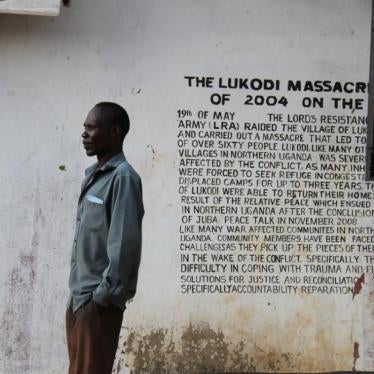(New York) - United Nations Security Council members should hold their ground in support of the International Criminal Court. Last week the Council rebuffed intense efforts by the Bush Administration to undercut the Court by vetoing UN peacekeeping operations in Bosnia.
Human Rights Watch sent a letter this week to Security Council members urging a united front ahead of the Security Council's Wednesday open meeting where states that have ratified the ICC Treaty will articulate their opposition to Washington's efforts to link peacekeeping operation in Bosnia to the ICC. The Council session precedes the July 15 deadline agreed to last week. The mandate for the Bosnia peacekeeping expired on June 21 but has been rolled over twice to allow time for further negotiations.
"Security Council members should resist the temptation to make an unprincipled compromise," said Richard Dicker, director of the international justice program at Human Rights Watch. "The U.S. has been holding hostage missions that save lives, and holding a gun to the heads of America's closest allies. To give in now would be wrong, it would weaken the ICC, and it would undercut international treaty-making in general."
On June 30, Washington vetoed extending the mandate of the Bosnia police operation but according to a subsequent announcement the U.S. will most likely leave in place its forty-six unarmed police trainers, as well as the U.S. contingent of the NATO-led SFOR.
On July 3, United Nations Secretary General Kofi Annan addressed his concerns in a letter to U.S. Secretary of State Colin Powell, saying, "the method suggested in the [U.S.] proposal flies in the face of treaty law since it would force States that have ratified the Rome Statute to accept a resolution that literally amends the treaty."
Dicker said that casting a veto for future resolutions would be politically much tougher for the Bush Administration, since the U.S. has compelling strategic reasons not to veto the operation in southern Lebanon.
"The Bush Administration has made its political point by casting a veto. Now let's move on and minimize the fallout by accelerating the transfer of peacekeeping authority to the European Union," said Dicker.
At an extraordinary session of the ICC Preparatory Commission Session meeting in New York on July 3, nearly 120 states articulated opposition to the US approach. Regional groups as well as individual states criticized the attempt to amend the treaty by Security Council resolution.
Human Rights Watch said the new court is the most important new human rights institution in fifty years. The treaty establishing the court took effect on July 1, 2002. The ICC Statute has been signed by 139 countries and ratified by 76 countries.
In May, the Bush administration repudiated the U.S. signature on the ICC treaty.
|
News Release
Security Council Needs a "United Front" On the ICC
Transfer Peacekeeping Authority to E.U.
Your tax deductible gift can help stop human rights violations and save lives around the world.
Region / Country
Most Viewed
-
February 11, 2026
Hong Kong: Conviction of Activist’s Father a Grim Milestone
-
February 22, 2024
“We Will Find You”

-
November 25, 2019
A Dirty Investment

-
March 29, 2021
“Everything I Have to Do is Tied to a Man”

-
December 16, 2025
Sexual Harassment of Chinese Critics Abroad


